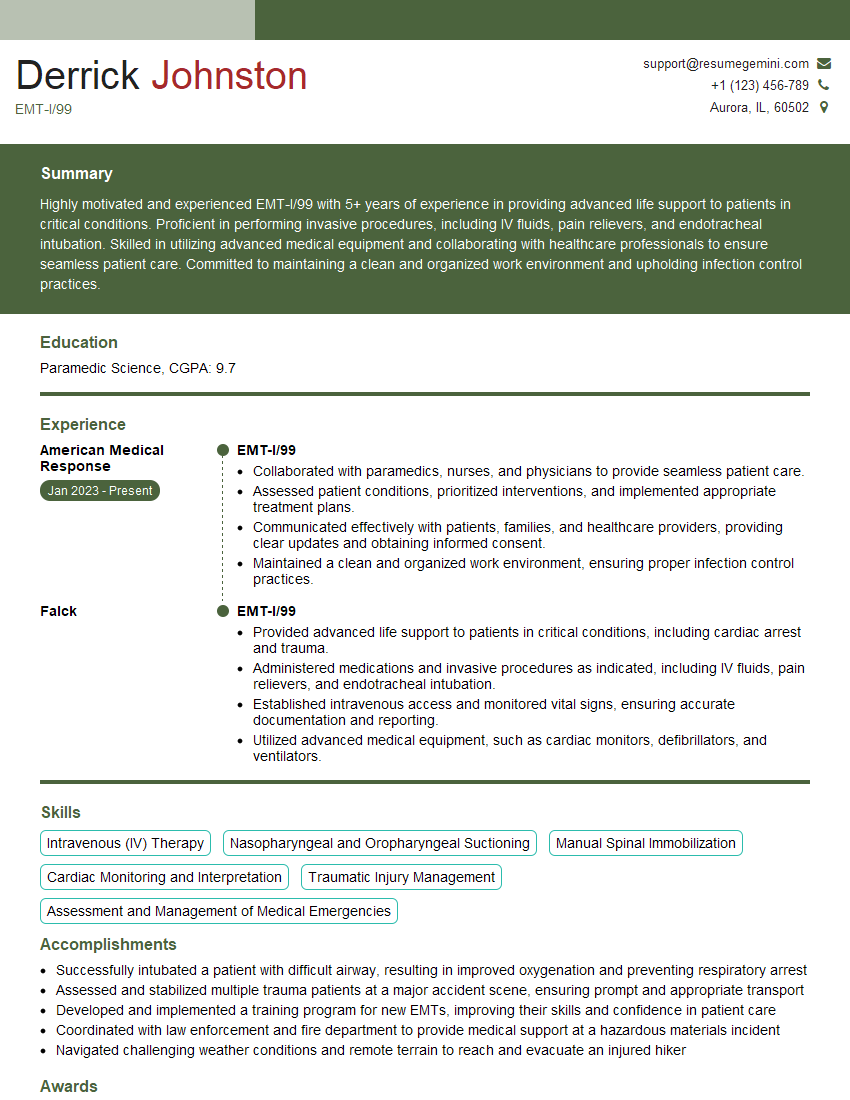Are you a seasoned EMT-I/99 seeking a new career path? Discover our professionally built EMT-I/99 Resume Template. This time-saving tool provides a solid foundation for your job search. Simply click “Edit Resume” to customize it with your unique experiences and achievements. Customize fonts and colors to match your personal style and increase your chances of landing your dream job. Explore more Resume Templates for additional options.

Derrick Johnston
EMT-I/99
Summary
Highly motivated and experienced EMT-I/99 with 5+ years of experience in providing advanced life support to patients in critical conditions. Proficient in performing invasive procedures, including IV fluids, pain relievers, and endotracheal intubation. Skilled in utilizing advanced medical equipment and collaborating with healthcare professionals to ensure seamless patient care. Committed to maintaining a clean and organized work environment and upholding infection control practices.
Education
Paramedic Science
December 2018
Skills
- Intravenous (IV) Therapy
- Nasopharyngeal and Oropharyngeal Suctioning
- Manual Spinal Immobilization
- Cardiac Monitoring and Interpretation
- Traumatic Injury Management
- Assessment and Management of Medical Emergencies
Work Experience
EMT-I/99
- Collaborated with paramedics, nurses, and physicians to provide seamless patient care.
- Assessed patient conditions, prioritized interventions, and implemented appropriate treatment plans.
- Communicated effectively with patients, families, and healthcare providers, providing clear updates and obtaining informed consent.
- Maintained a clean and organized work environment, ensuring proper infection control practices.
EMT-I/99
- Provided advanced life support to patients in critical conditions, including cardiac arrest and trauma.
- Administered medications and invasive procedures as indicated, including IV fluids, pain relievers, and endotracheal intubation.
- Established intravenous access and monitored vital signs, ensuring accurate documentation and reporting.
- Utilized advanced medical equipment, such as cardiac monitors, defibrillators, and ventilators.
Accomplishments
- Successfully intubated a patient with difficult airway, resulting in improved oxygenation and preventing respiratory arrest
- Assessed and stabilized multiple trauma patients at a major accident scene, ensuring prompt and appropriate transport
- Developed and implemented a training program for new EMTs, improving their skills and confidence in patient care
- Coordinated with law enforcement and fire department to provide medical support at a hazardous materials incident
- Navigated challenging weather conditions and remote terrain to reach and evacuate an injured hiker
Awards
- Lifesaving Award for rescuing a patient from a burning building
- EMS Star of Life Award for Outstanding Service
- EMS Stat Test Platinum Award for 100% score on proficiency test
Certificates
- Advanced Cardiovascular Life Support (ACLS)
- Pediatric Advanced Life Support (PALS)
- Trauma Nursing Core Course (TNCC)
- Emergency Medical Technician-Intermediate (EMT-I)
Career Expert Tips:
- Select the ideal resume template to showcase your professional experience effectively.
- Master the art of resume writing to highlight your unique qualifications and achievements.
- Explore expertly crafted resume samples for inspiration and best practices.
- Build your best resume for free this new year with ResumeGemini. Enjoy exclusive discounts on ATS optimized resume templates.
How To Write Resume For EMT-I/99
- Highlight your relevant skills and experience in your resume summary and job descriptions.
- Quantify your accomplishments with specific metrics to demonstrate your impact.
- Use industry-specific keywords throughout your resume to increase visibility to recruiters.
- Proofread your resume carefully for any errors before submitting it.
- Consider obtaining additional certifications, such as ACLS or PALS, to enhance your qualifications.
Essential Experience Highlights for a Strong EMT-I/99 Resume
- Provided advanced life support to patients in critical conditions, including cardiac arrest and trauma.
- Administered medications and performed invasive procedures as indicated, including IV fluids, pain relievers, and endotracheal intubation.
- Established intravenous access and monitored vital signs, ensuring accurate documentation and reporting.
- Utilized advanced medical equipment, such as cardiac monitors, defibrillators, and ventilators.
- Collaborated with paramedics, nurses, and physicians to provide seamless patient care.
- Assessed patient conditions, prioritized interventions, and implemented appropriate treatment plans.
- Communicated effectively with patients, families, and healthcare providers, providing clear updates and obtaining informed consent.
Frequently Asked Questions (FAQ’s) For EMT-I/99
What is the role of an EMT-I/99?
An EMT-I/99, also known as an Intermediate Emergency Medical Technician, provides advanced life support to patients in critical conditions. They are trained to perform invasive procedures, such as IV fluids, pain relievers, and endotracheal intubation, and collaborate with healthcare professionals to ensure seamless patient care.
What are the requirements to become an EMT-I/99?
To become an EMT-I/99, you typically need to complete an approved EMT-I/99 training program and pass a national certification exam. Some states may also require additional training or experience.
What are the earning prospects for an EMT-I/99?
The earning prospects for an EMT-I/99 can vary depending on factors such as experience, location, and employer. According to the U.S. Bureau of Labor Statistics, the median annual salary for EMTs and paramedics was $36,650 in May 2021.
What are the career advancement opportunities for an EMT-I/99?
EMT-I/99s can advance their careers by obtaining additional certifications, such as ACLS or PALS, or by pursuing higher education in paramedicine or nursing.
What is the job outlook for EMT-I/99s?
The job outlook for EMT-I/99s is expected to be positive in the coming years. The aging population and the increasing demand for emergency medical services are expected to drive job growth.
What are the best ways to prepare for an EMT-I/99 interview?
To prepare for an EMT-I/99 interview, you should research the organization and the position, practice answering common interview questions, and dress professionally. You should also be prepared to discuss your experience, skills, and qualifications, and how they align with the requirements of the job.
What are the key skills that employers look for in an EMT-I/99?
Employers typically look for EMT-I/99s with strong clinical skills, such as IV therapy, nasopharyngeal and oropharyngeal suctioning, and manual spinal immobilization. They also look for candidates with good communication and interpersonal skills, as well as the ability to work well in a team environment.